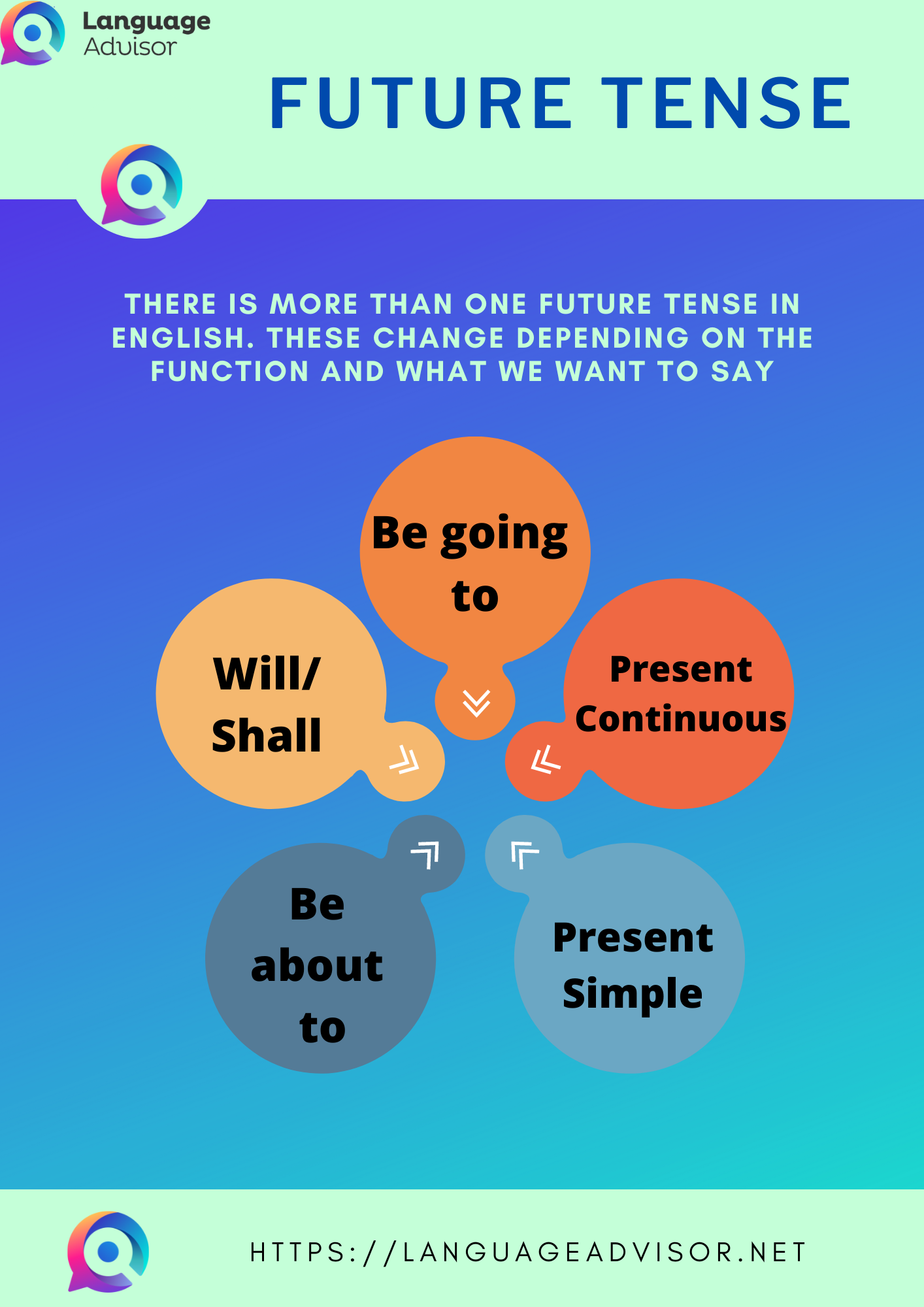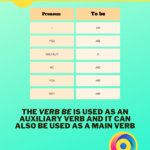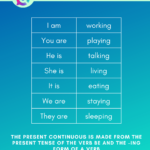English Future Tense. English grammar with exercises. English ESL Worksheets. Free eBook and Free printable PDF
English Future Tense
English Future Tense

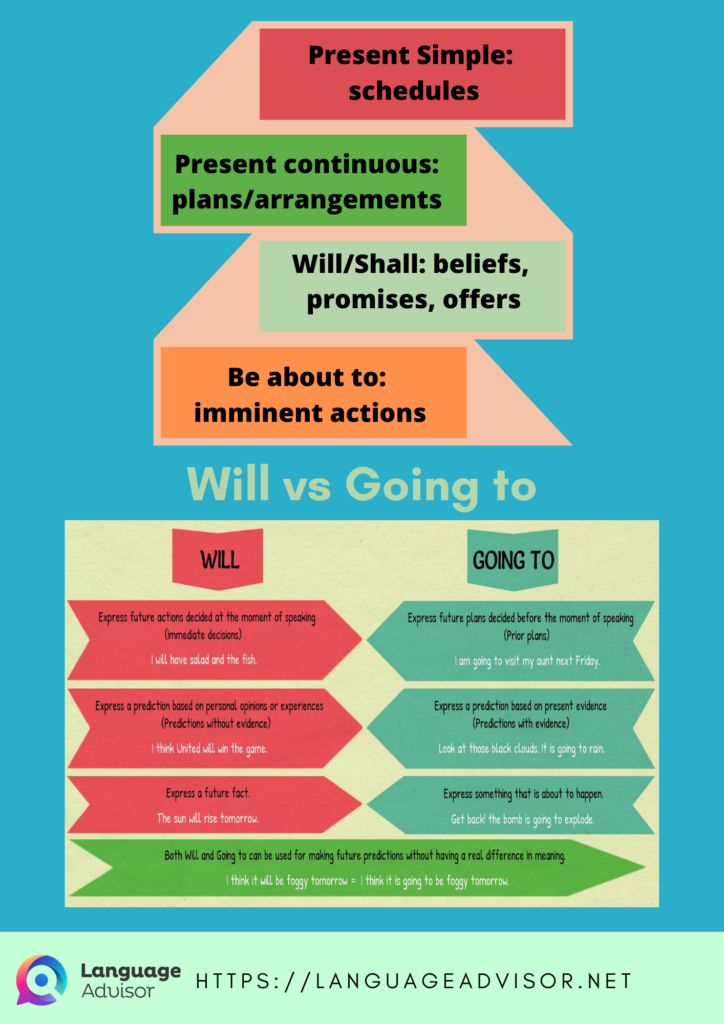

English Future Tense
There is more than one future tense in English. These change depending on the function and what we want to say.
When we know about the future, we normally use the present tense.
1. We use the present simple for something scheduled:
We have a lesson next Monday.
The train arrives at 6.30 in the morning.
The holidays start next week.
It‘s my birthday tomorrow.
2. We can use the present continuous for plans or arrangements:
I‘m playing football tomorrow.
They are coming to see us tomorrow.
We‘re having a party at Christmas.
3. We use will:
- when we express beliefs about the future:
It will be a nice day tomorrow.
I think Brazil will win the World Cup.
I’m sure you will enjoy the film.
- to mean want to or be willing to:
I hope you will come to my party.
George says he will help us.
- to make offers and promises :
I‘ll see you tomorrow.
We‘ll send you an email.
- to talk about offers and promises:
Tim will be at the meeting.
Mary will help with the cooking.
4. We use be going to:
- to talk about plans or intentions:
I‘m going to drive to work today.
They are going to move to Manchester.
- to make predictions based on evidence we can see:
Be careful! You are going to fall. (= I can see that you might fall.)
Look at those black clouds. I think it’s going to rain. (= I can see that it will rain.)
Form
- It is made up of the verb will/won’t + base infinitive (infinitive without to).
- Because will is a modal verb it doesn’t change depending on the person doing the action.
- We can use contractions e.g. I will = I’ll.
- In the negative, we can also use will not for more emphasis.
- Won’t is more common in speech.
- In short answers we say: yes X will or no X won’t.
Here’s a look at the future simple in positive and negative statements and questions.
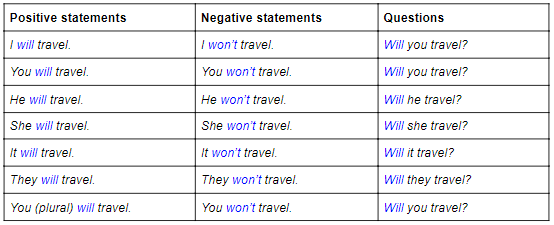

Uses and examples
- Instant or spontaneous decisions – I’m hungry. I think I’ll make a sandwich.
- Future predictions based on a belief – I’m sure you’ll pass the test.
- Promises – I won’t tell anyone your secret.
- Offers – I’ll carry your bags for you.
- Requests – Will you tell Henry I called?
- Threats – If you do that again, I’ll tell Mum.
- Future facts – I’ll be back later tonight.
Be about to
Be (just) about to allows us to express an imminent action, or a very near future:
The train is just about to leave. The train will leave very soon.
Shall
We can use shall instead of will for future time references with I and we. However, it is slightly more formal.
E.g. We shall never forget this beautiful day.
It is also common to use shall in questions to make offers, suggestions or ask for advice.
E.g. Shall I carry these bags for you?
Shall I open the window?
What shall I tell Mary about the broken vase?
Be going to vs will
It’s important to note that for predictions based on evidence and for future plans we use be going to not will.
E.g. Look at those grey clouds. It’s definitely going to rain!
– What are you doing after work?
– I’m going to the gym.
HAVE TO to express necessity and obligation in future
To express obligation, duty or necessity in the future, must and need are not used. They are replaced by have to:
We must (need to) buy another ticket.
We’ll have to buy another ticket later.





English Future Tense: exercises
FUTURE TENSES
PRESENT CONTINUOUS WITH FUTURE MEANING
EXERCISE 1
Here is a page taken from Pamela’s diary for next week.
| Monday | 10.30 1.00 pm | Dentist. Lunch with Thomas. |
| Tuesday | Morning 4.00 pm | Washing up. Shopping with Diana. |
| Wednesday | morning 2.30 pm | Visit mum in Piacenza. Group Class at Opening. |
| Thursday | 11.00 afternoon | Tea with Sandra. Clean the house. |
| Friday | morning afternoon | Ironing. Buy a present for Thomas’ birthday. |
| Saturday | 10.00 8.30 pm | Hairdresser’s. Dinner with Thomas. |
Write sentences using the information from Pamela’s diary in the Present Continuous.
E.g. On Monday, at 10.30 Pamela is going to the dentist.
WILL AND SHALL
EXERCISE 1.
Complete the sentences by writing will or shall in the correct spaces.
e.g. Shall we go to the cinema tonight?
I will buy lunch today.
I _________ go to the cinema tonight.
__________ I cook the dinner tonight?
My father _________ buy the newspaper.
__________I open the window?
I _________ get a taxi to work.
________we go to Venice this weekend?.
WILL
EXERCISE 2.
What would your instant decision be in the following situations? Use the following verbs to help you write the answer: answer, phone, wash, make, clean, drive, carry, lend.
e.g. The telephone rings. -> I will answer it.
1. This bag is very heavy. I will__________
2. Susan doesn’t want to wash the dishes. I will__________
3. I’m hungry. I will__________
4. When will you phone me. I will__________
5. I don’t want to drive. I will__________
6. I don’t have any money. I will__________
7. The window is very dirty. I will__________
FUTURE: TO BE ABOUT TO + INFINITIVE
We use the fixed expression to be about to + infinitive to make statements about an action in the near future.
The word just can be added to make the action even more immediate.
E.g. My friend Daniel asks me to come and play football with him. I respond with the following statement;
“Sorry, I can’t. I’m just about to drive my sister to the airport.”
EXERCISE 1.
Complete the following exercises with the correct form of to be about to and the correct verb from the list.
Fall, sink, explode, leave.
1. Tic, tic, tic. The bomb !
2. Hurry up! The train the station!
3. Watch out! The glasses off of the tray!
4. Abandon ship! The boat into the sea!
EXERCISE 2.
Answer the questions using just and the correct form of be about to with the clues provided.
Do you want to come to the swimming pool with us? (go home / have lunch). No thanks,
Are Jeffrey and Anne going to help us carry the boxes? (go / cinema)
No thanks,
Are you and Greg busy? (do our homework)
Yes,
Is she going to the British Museum? (go / Buckingham Palace)
No,
PRESENT SIMPLE WITH FUTURE MEANING
The present simple can have a future meaning when used with verbs referring to a timetable, a schedule, or a programme.
E.g. Tonight I will go to the cinema to see the film “Haunted House II”. It starts at 9 pm and finishes at 11 pm..
EXERCISE 1.
Using the table and clues provided, write sentences with the present simple.
| Start/leave/depart/take off | Finish/arrive/land | |
| Train London – Manchester | 9:00 | 13:45 |
| Plane Milan – Paris | 20:00 | 21:30 |
| Film “Big Ben Strikes Again” | 18:30 | 20:20 |
| Bus Reading – Bath | 14:10 | 16:35 |
| Opera “Flowers for Flora” | 19:00 | 22:00 |
E.g. train / 9:00
The train leaves London at 9:00 am. OR The train departs from London at 9:00 am.
bus / in Bath / 16:35
film / 18:30
opera / 22:00
plane / in Paris / 21:30
bus / Reading / 14:10
plane / from Milan / 20:00
FUTURE TENSE OF THE VERB “TO HAVE TO”
EXERCISE 1.
Complete the following sentences by using the future tense of “have to”.
e.g. Tomorrow, if it is raining, I will have to take the bus to school.
After the party, you __________________ (clean) the whole house.
When we’ll arrive at the hotel, we ______________ (register) at the front desk.
The passengers ____________ (wait) for the train on platform 2 tomorrow.
If you want to drive in Canada, you _______________ (change) your driving licence.
During the cruise, we ____________ (pay) for extras.
This year, people who are travelling by plane with more than two bags _______________ (pay) a surcharge.
Because of tomorrow’s strike, trains ____________ (stop).
You __________ (take) a bus, because the trains are not running.
If you travel by bus in Italy, you __________ (buy) your ticket in advance.
EXERCISE 2.
Re-write the following letter using the future tense of the verb “ to have to”.
Dear Mary,
Tomorrow your plane leaves at 9 o’clock in the morning.
e.g. In order to catch it, you will have to wake Tim up at 6 o’ clock, so that he can eat breakfast and check out from his hotel room.
My advice: you __________(to meet) him there! Outside the hotel you________ (to ask) for a taxi, and ________(to tell) the driver to take you to the International Airport. Remember that you ___________ (to check in) one hour in advance! It is a two-hour flight. When you land in Paris, you__________ (to go) to the tourist office where you________ (to ask) for directions to the underground. Remember that you__________ (to change) your money at the airport. Once you get out at the Eiffel Tower, you _________ (to take) a ferry to Notre Dame. When you reach the cathedral, you __________ (to walk) alongside the riverbank and at the 3rd set of traffic lights you_______ (to turn) left and continue to the end of the road. My house is the blue one. The bell is broken, so you_________ (to call) me on my mobile phone. Remember that I __________ (to go) to work at 2 o’clock, so if you are late, just walk straight along the road to the end. Go into the building on the right and you___________ (to ask) the receptionist to call me.
See both of you tomorrow, Love Susan
EXERCISE 3.
Re-write the following sentences by using the negative form of the future tense of the verb “to have to”.
e.g. Next Friday, I’ll have to go out.
Next Friday, I will not have to go out / I won’t have to go out.
They (to go) to the cinema.
She (to marry) Tom.
We (to reserve) two hotel rooms.
You (to play) tennis next Wednesday.
He (to study) the whole book.
I (to go) to school on Sunday.
We (to call) our French friends every night.
She (to wear) a uniform in the office.
You (to change) your car soon.
He (to call) the airline to confirm the flight.
EXERCISE 4.
Now, re-write the following sentences in the interrogative form.
e.g. Next Friday, I will have to go out.
Next Friday, will you have to go out ?
They (to go) to the cinema.
She (to marry) Tom.
We (to reserve) two hotel rooms.
You (to play) tennis next Wednesday.
He (to study) the whole book.
I (to go) to school on Sunday.
We (to call) our French friends every night.
She (to wear) a uniform in the office.
You (to change) your car soon.
He (to call) the airline to confirm the flight.
FUTURE TENSES
EXERCISE 1.
Underline the correct option in the following predictions.
Example:
Are you sitting comfortably? Then I’ll/I’ll have to begin.
I think England will/are going to win the world cup.
You will/will have to marry a tall dark handsome stranger.
I will/will have collected a hundred shells by the end of my holiday.
Mankind will/will have to live on the moon by the year 2010.
Tomorrow I’ll/I’ll be in Spain on the beach, having a cocktail.
In the year 3000 everybody will have/will eleven fingers.
Alien life will be/will discovered on Mars.
Rats will/will have to take over the Earth.
EXERCISE 2.
Now create your own predictions of what will happen in the following time spans.
Tomorrow
________________________________________________________________
Next week
________________________________________________________________
Next year
________________________________________________________________
2010
________________________________________________________________
2050
________________________________________________________________
2500
________________________________________________________________
3000
________________________________________________________________





All downloads are in PDF format
English Future Tense exercises: eBook and PDF
BROWSE THE EBOOK ONLINE OR DOWNLOAD THE PDF FOR FREE





DOWNLOAD THE PDF FOR FREE






